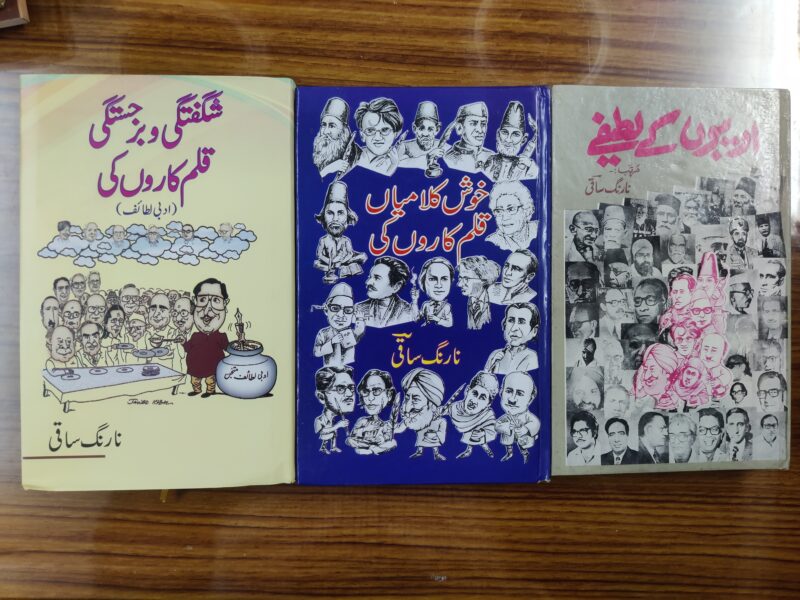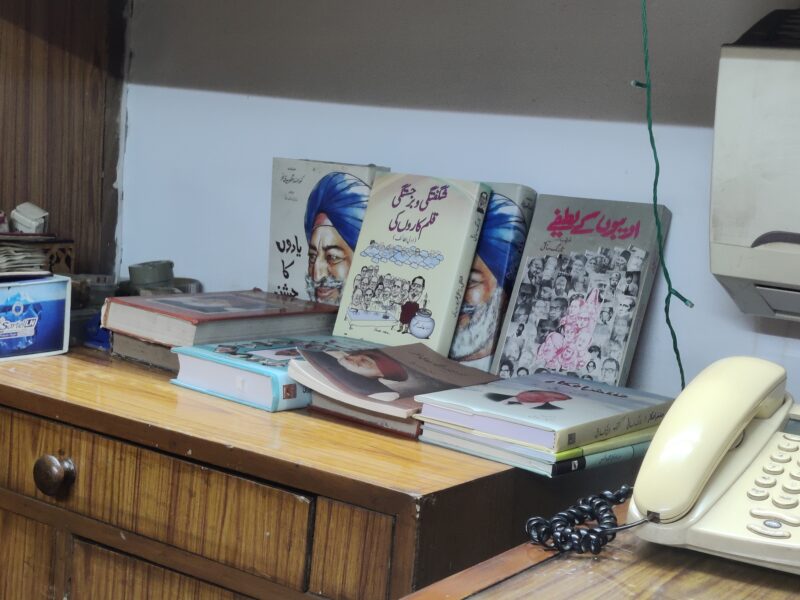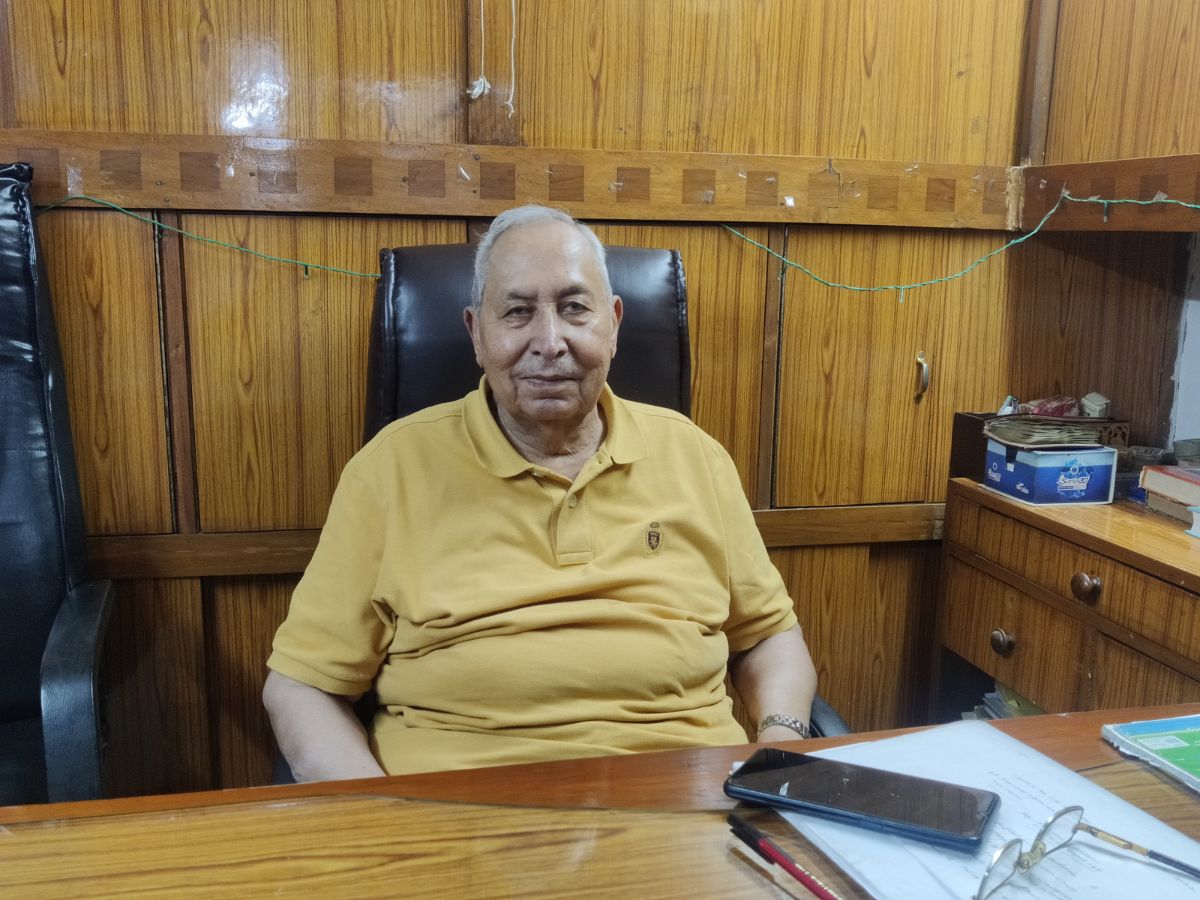KL Narang ‘Saaqi’, who has carved a niche for himself by specialising in compiling humorous incidents and quotes of Urdu litterateurs, showed early signs of his love for documenting events worthy of a chuckle when he started a newspaper in his college in the mid-1950s.
“I was pursuing Bachelors in Arts at DC Jain College in Ferozepur, Punjab, when I started this newspaper, Saaqi. I would spend most of the pocket money (Rs 50-60 per month) I’d get from home on bringing out this paper. I started publishing anything that was happening on the college campus – nothing would stay secret, and everything would be reported in the paper, creating a furore,” recalls the 87-year-old in his small office in a Connaught Place building adjacent to Barakhamba Road.
“The result of my endeavour was that I was told by college authorities to leave the college since I was embarrassing the girls and boys by publishing everything, including their affairs. The college authorities were so fed up that they said either you leave or we will throw you out. The newspaper had to shut down after running for a year or two. I left after completing the degree but not before giving it back to the authorities saying that I too am not keen on staying here,” recalls Narang Saaqi, who had studied the Urdu language in primary school in his native Punjab village, Sodhi Nagar (earlier known as Sultan Khan Wala), before shifting to Ferozepur city for middle school and further studies.
The school, Government Lower Middle School, in his village where father Lala Sundar Das was a zamindar (landholder), did not have classes beyond the sixth standard. It had been Urdu medium till 1947, which was around the time he graduated from it and shifted to Ferozepur.
Thanks to the initial grounding in the language, the fascination for it and its poets and writers stayed on.

Checking on the newspapers
In Ferozepur, he’d drop into newspaper offices.
“There were four Urdu weekly papers coming out of Ferozepur. I used to go and sit in the newspaper offices and see what was happening. There was a paper Chingaari, its editor was Bihari Lal Diwan Nath. His son Satpal ‘Baaghi’ became my friend. He was eight-nine years older to me but I used to visit his office and see how things work,” reminisces Narang Saaqi.
Those jaunts, especially to Chingaari, were what inspired him to come out with the college paper.
After college in Ferozepur, Saaqi shifted to Amritsar in 1957 as a 21-year-old and with friend Gian Chand Gulati, another one with a taste for literature, set up a hotel.
“We started a hotel – Green Hotel. It wasn’t successful,” he says before revealing that the 3-4 years of stay in Amritsar wasn’t all that bad.
“After all, about 100-150 yards from the hotel, there was the office of a newspaper called Pagdandi. That was a very standard newspaper. The editor of Pagdandi, Amreek Anand, was friends with Pakistani poet Qateel Shifai (who also gave lyrics to Bollywood movies like Sir and Phir Teri Kahaani Yaad Aayi among others later on). Thanks to Anand, I became friends with him too and would go to Lahore to attend events. They’d come this side too. The travels also took place on the sidelines of cricket matches. We’d be hosted well there. But the 1965 war stopped it all.”
When the hotel business didn’t work out and the war stopped almost everything – including phone calls, Narang Saaqi shifted to Chandigarh and entered international business.
“My interest in literature took a backseat in Chandigarh as I got busy with business. Had no time to think of anything else. After staying for five years in Chandigarh, I decided to move to Delhi and took this office in 1973-74,” he says of the small room that works as his office.
He largely ‘imported chemicals and other things where there would be margin’.
Amreek Anand had gone to Bombay after leaving Amritsar but stayed in touch with Narang Saaqi, who by now had removed ‘Saaqi’ from his name and used only KL Narang since literature days were seemingly over.
“One day, I learnt from Anand that Shifai was coming to Bombay and then Delhi. I contacted him and he said he would stay with Kanwar Mahendra Singh Bedi, an Urdu poet of renown, in Greater Kailash. After staying with him for two-three days, Shifai shifted to my place and soon Bedi Sahab would come to my house too. Shifai and Bedi helped introduce me to some big names in literature and soon, I started putting my pen name ‘Saaqi’ back with KL Narang. It was a sort of rebirth and since then, despite my business I kept pursuing my love for literature.”
The first book under his name was an ode to Bedi.
“We celebrated his jashn (commemoration). The idea was to compile articles on Bedi and publish a book. A famous Urdu scholar Malik Ram was made the chairman of the committee for the festival and the first draft had ‘Compiled by Malik Ram’ on the cover. Malik Ram objected to the compilation being credited to him and asked me to change it to ‘Compiled by KL Narang Saaqi’.”
That gave him confidence and he ventured into writing a book.
“When I was a kid, there used to be a poet called Naresh Kumar Shad. He’d work on these Adabi Lateefay (literary humour), which used to get published in newspapers. They used to be very interesting. He was the one who inspired me. But he did it at a very small level, publishing a few booklets. I thought why not take it to a bigger level,” says Narang Saaqi.
“I was friends with a few writing humour. So, I suddenly thought one day, why not collect literary jokes and humour. My first book was published in 1993 called Adeebon Ke Latifay (Humorous incidents/Jokes of the poets). It was published in Pakistan too. I kept the same name of my second book. In the third book, I added new things. That book was published here, and also in Lahore by the same name. Then I wrote Khushkalaamiyan Qalam Kaaron Ki (Humorous sayings of the writers), which was published in Urdu and Hindi.”
The latest, Shaguftgi wa Barjastagi Qalam Kaaron Ki (humorousness and quick-wittidness of writers) came in 2019 and 90% of the funny sayings and incidents about the poets and writers in the book are new and different from those in the previous edition.

Hard work and passion go together
“To be honest, such kind of work requires passion and a keen eye. I would read Urdu literature whenever I’d get time, would read late at night and then in the morning too. I used to read a lot in the bathroom and in car. Would keep reading. In fact, I still read. I am still habituated to taking a book and paper in the bathroom.”
He faced ups and downs in his business but the love for literature never subsided.
“In business, ups and downs kept happening but I never faced any major problem that would impact me adversely.
“Business is completely different from your interest [in literature]. When your interest reaches the level of passion then nothing seems challenging. Though my work never suffered due to my passion. There is no big poet from India or Pakistan who has not come to my home. Every 10th day, someone from outside would come and we’d host a party.”
Elaborating on the work that goes into compiling a unique genre such as this, Narang Saaqi says he relied a lot on autobiographies.
“You have to work very hard for this. One, you have to go through autobiographies and search for interesting things. Even if there is a touch of humour in it, you extract it. You get jokes (interesting incidents) in the travel diaries and you twist them a bit. I don’t add anything but only twist the language a bit to make it sound more interesting.
“You have to read a lot. If you read a whole book, you may get one joke out of it. I keep noting such jokes and keep putting these notes in a bag. When the number of such notes reaches 100-200, I pen them down on paper. When it turns into 300 pages — a book form — I give to computer wala (for typing). Then, I put them in order before sending it for publishing.”
The octogenarian still reads a lot.
“I still read 3-4 hours a day although I used to read a lot more back then.”
He only occasionally visits his office as he shut his business after losing interest in it in 2015, when one of his sons died in 2015. But the passion for literature remains. It is quite evident from all his works neatly placed in order next to his table, occupying a place of pride and honour.





